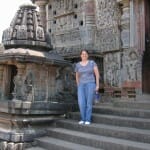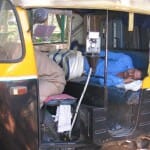“When we are no longer able to change a situation – we are challenged to change ourselves.” Victor E. Frankl

Belur, India
I was alone and nowhere near my husband or family. Not only was I by myself, but I was also in a foreign land where I felt unconnected to the people around me.I was an American expat living in India. I was outside my comfort zone. I was living solo in my eldest son’s apartment in Bangalore. He was in New Delhi, hours away by plane. My husband was back in the US with 3 of our children. How was I going to cope?
For the time being, I could not change my situation, I had to adapt. I followed Victor Frankl’s advice by resolving to make personal changes.I had to face my new challenge. I had to change. I couldn’t dwell on my unusual predicament.
It was vital that I seek ways to connect with others. Loneliness was taking its toll. Any inclination to be reserved had to be abated. Whatever fears I had had to be dismissed. I needed to be proactive.
Mobility was an initial concern. The inability to effectively communicate with taxi drivers and rickshaw drivers wasproblematic.Many made it seem that they did not understand English. Was this true? I didn’t know. Being subject to

an unethical driver or being stranded at an unknown location was something I wanted to avoid. But, if I wanted to make connections, I needed to overcome this major hurdle.
Accepting the possible risks associated with a rickshaw adventure, I mustered the courage and overcame my fears. I rode to a posh 5 star hotel where the Overseas Women’s Club of Bangalore met each week. I had faced my apprehensions and accepted the challenge to change. I was proud that I had not become paralyzed by a sea of uncertainty and doubt.
As a result, I was able to connect with others who commiserated with my plight. Expats from many countries hovered together drinking tea and eating crackers. Some were like me an American expat, but many came from Europe and Canada. All candidly admitted to experiencing culture shock. I was no longer alone. Camaraderie saved the day. A smile, an engaging conversation, and a shared lunch restored my confidence. Just listening made me realize that my experiences were similar to others.
We had all left a comfort zone that included both positive and negative aspects. Our journeys required us to leave behind a familiar existence for something foreign. The desire to remain attached to one’s normal turf was a persistent message. Only a few adventurous souls embraced the excitement of the unknown and demonstrated no reservations. For most the proverb Better the devil you know than the devil you don’t know applied.
The one’s who realized that personal change was crucial to survival accepted their new challenge. Those adhered to this belief understood that riding the wave of change was essential. They needed to summon their own resiliency and then they’d be a position to lend a helping hand to others.
Expats who had weathered their own personal storms freely offered advice and reassurance. Smiles were seen throughout the room. Instinctively the expat women were following Audrey Hepburn‘s advice-
“Remember if you ever need a helping hand, it’s at the end of your arm, as you get older, remember you have another hand: The first is to help yourself, the second is to help others.
MAY THIS BE THE BEST YEAR OF YOUR LIFE is available on Amazon.
I’d love to hear your honest feedback. Published authors thrive on blog comments, Amazon critiques, Goodreads reviews as well as other online book evaluations.
.
Leave a Reply
You must be logged in to post a comment.